






The Salvation Army is a Christian church and registered charity seeking to share the good news of Jesus and nurture committed followers of him. We also serve people without discrimination, care for creation and seek justice and reconciliation. We offer practical support and services in more than 700 centres throughout the UK. Go to salvationarmy.org.uk/find-a-church to find your nearest centre.
The Salvation Army first published a newspaper called the War Cry in London in December 1879, and we have continued to appear every week since then. Our name refers to our battle for people’s hearts and souls as we promote the positive impact of the Christian faith and The Salvation Army’s fight for greater social justice.
The sound of leather on willow can still be heard on cricket pitches across the country, but that can’t deflect from the excitement of the football season, which is now in full swing.
Tens of thousands of people have been filling stadiums to watch their teams, while kids have been setting up improvised goalposts for kick-abouts and dreaming of playing alongside their footballing heroes.
If those heroes are professionals in the Premier League, they could be paid millions of pounds for playing the beautiful game. But taking part in a football match can be enjoyed by people from all walks of life – including those experiencing homelessness.
In this week’s War Cry we find out more about the Homeless World Cup, which this year is being hosted by The Salvation Army in Norway. It is the 20th time that the competition has been held for teams made up of men and women who are experiencing, or have experienced, homelessness.
Editor: Andrew Stone, Major
Deputy Editor: Philip Halcrow
Staff Writer: Emily Bright
Staff Writer: Claire Brine
Staff Writer: Ewan Hall
Editorial Assistant: Linda McTurk
Graphic Designer: Mark Knight
Graphic Designer: Natalie Adkins
Email: warcry@salvationarmy.org.uk
The Salvation Army
United Kingdom and Ireland Territory
1 Champion Park London SE5 8FJ
Tel: 0845 634 0101
Subscriptions: 01933 445445 (option 1, option 1) or email: subscriptions@satcol.org
Founders: Catherine and William Booth
International leaders: General Lyndon Buckingham and Commissioner Bronwyn Buckingham
Territorial leaders: Commissioners Jenine and Paul Main
Editor-in-Chief: Major Julian Watchorn
and Ireland Territory ISSN 0043-0226
The Salvation Army Trust is a registered charity. The charity number in England, Wales and Northern Ireland is 214779, in Scotland SC009359 and in the Republic of Ireland CHY6399. Printed by CKN Print, Northampton, on sustainably sourced paper


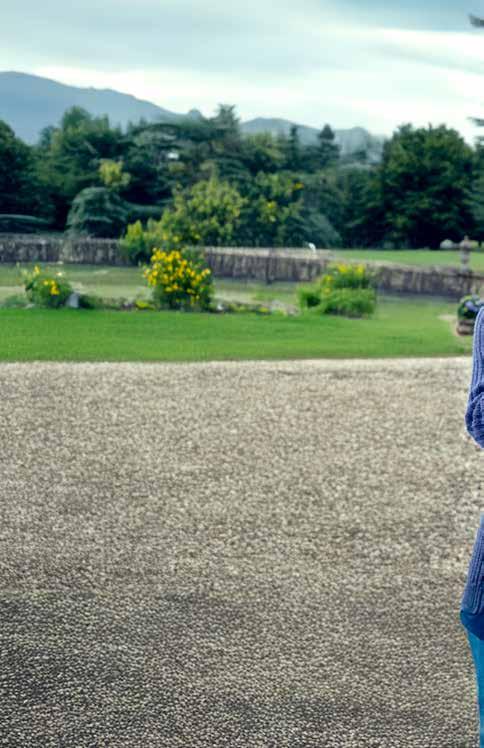
‘We had the first event in 2003 in Austria,’ Homeless World Cup co-founder Mel Young tells us. ‘It was an outstanding success in lots of ways. First of all, homeless people changed out of all recognition. Secondly, crowds came to watch and were cheering homeless people, which was not – certainly at the time – usual. Thirdly, the world’s media turned up and wrote positive stories, when – particularly in the UK – there were a lot of negative stories in the press about how homeless people were causing the economy to crash.’
It is the second time that The Salvation Army in Norway has hosted the tournament, and project leader for Oslo 2025 Major Knut Haugsvær explains that – as it did back in 2017 – it is providing a church tent at the venue. Inside the tent there is food, conversations and sometimes music.
‘This is how The Salvation Army is,’ Knut says. ‘We are a church without walls.’
The Salvation Army has been sharing the good news of Jesus for 160 years. And the results in people’s lives are as real today as they have ever been.
When you’ve read the War Cry, why not pass it on ➔ ➔ ➔


Retirement village residents Joyce, Ibrahim, Elizabeth and Ron are amateur sleuths
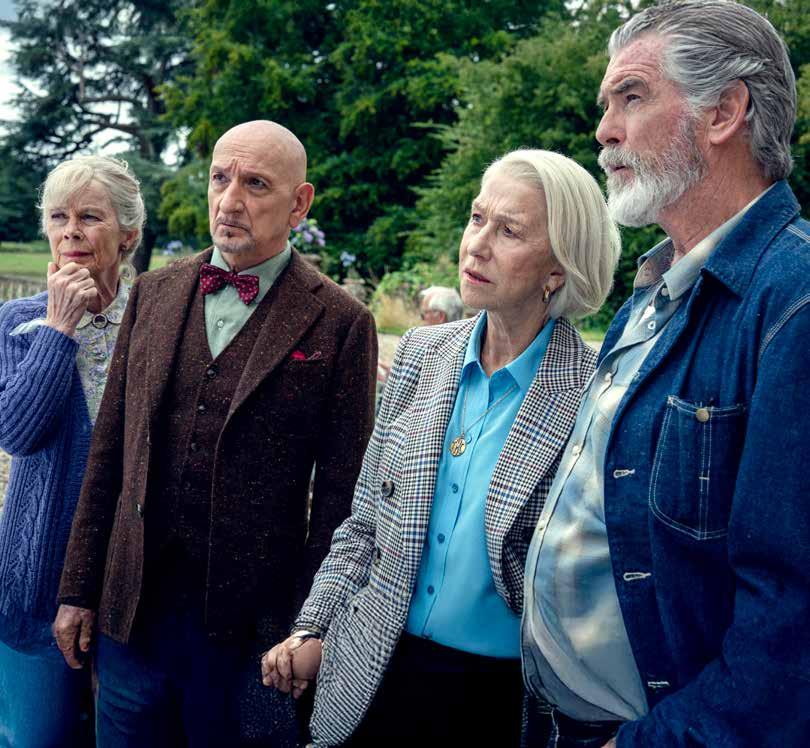
Film preview: The Thursday Murder Club Netflix from 28 August
By Andrew Stone
Aretirement village may seem an unlikely setting for a murder story – but the adventures of four crime-solving pensioners living in Coopers Chase have delighted millions of readers. And from next Thursday – appropriately – those investigations will be brought to life in the film The Thursday Murder Club, streaming on Netflix.
Elizabeth (Helen Mirren), Ron (Pierce Brosnan), Ibrahim (Ben Kingsley) and Joyce (Celia Imrie) meet every Thursday in the community centre at the village to go through historical unsolved murders. Using their combined life experiences, they while away a few hours trying to spot any clues that the police may have missed.
However, when a dead body is found much closer to home, the four retirees decide that they are the ideal people to solve the crime – regardless of the dangers that doing so may put themselves in.
Written by TV presenter Richard Osman, the intriguing plotlines that twist and turn through the pages of his four Thursday Murder Club novels not only pose whodunnit puzzles, but also humorously portray the retirement village residents trying to get to grips with modern-day developments such as recycling waste policies and social media.
The escapades of the pensioners as they solve crimes, take on challenges, learn new things and try to help the people around them have captured the imagination of readers around the world.
Perhaps that is because the stories give people hope that getting older isn’t something to be dreaded and that life can still be fulfilling as they age.
But even as we smile as fictitious geriatrics navigate their way through new experiences, we may end up wondering –and sometimes worrying – about what the future may hold for us.
Whether or not retirement seems an age
away, there can be more immediate matters that make our near future uncertain. We may have worries about our health, relationships or even how wars, the economy or AI will impact us.
When the years ahead seem unclear, countless people have found strength and hope in their certainty of God’s love being with them. Their faith doesn’t mean that they don’t face tough times or have concerns about the future, but they know that, whatever may happen, God will be with them, helping them through.
One Bible passage puts it this way: ‘God is a strong place for us, where he will keep us safe. He will always help us when troubles come’ (Psalm 46:1 Easy English Bible).
While none of us know exactly what the future may have in store, it’s good to recognise that God offers his help to anyone who will follow him. If we turn to him, we can experience his love and guidance in our lives – and that’s definitely something worth investigating.
Claire Brine gives her take on a story that has caught the attention of War Cry reporters
‘Digital resurrection: fascination and fear over the rise of the deathbot.’ This headline in The Guardian caught my eye. The article, written by Harriet Sherwood, said that at a recent Rod Stewart concert, fans were able to see AI-generated images of music legends Ozzy Osbourne, Michael Jackson and Tina Turner being beamed on to the stage ‘from some kind of rock Heaven’.
More than a third of parents in the UK are experiencing financial hardship this summer, according to a survey carried out by nfpResearch in association with The Salvation Army.
I’ve had many years to accept his death
While some, reported Harriet, denounced the images as disrespectful, ‘others found the tribute beautiful’. She went on to consider the ethical implications of ‘digital resurrection’, which includes ‘creating images and bots of people who have died’ by using photographs, videos and voice messages. Although companies which offer to create ‘deathbots’ are expanding, she wrote, ‘questions about exploitation, privacy and their impact on the grieving process are multiplying’.
Some of the questions have come from Nathan Mladin, author of the report AI and the Afterlife, published by theology think tank Theos. Harriet quoted him as saying that deathbots can be deceptive because ‘you think you’re talking to a person when you’re actually talking to a machine’. Nathan said that ‘people can become dependent on a bot, rather than accepting and healing’.
Having lost my dad to cancer when I was a teenager, I’ve had many years to accept his death. Often I’ve wondered what it would be like to know him now that I’m an adult.
But does the idea of Dad the Deathbot appeal? I don’t think it does. While my heart still aches for him, an AI-generated image of my dad wouldn’t really be my dad – and that would feel sad.
What brings me greater comfort is the belief that my dad is enjoying eternal life in Heaven, because of his faith in Jesus. And I hope to experience the same one day.
The Bible tells us that days after Jesus was put to death on a cross, he was raised to life by God’s power. By defeating death, he made it possible for us too to know life after we die.
When our time on Earth comes to an end, our life doesn’t have to. If we put our faith in Jesus, we can experience of Heaven – for real.
The online survey of 299 parents found that 35 per cent planned to skip meals so that their children could go to a holiday club, and 36 per cent could not afford to pay for childcare over the summer. Results also showed that 30 per cent are not able to take their children on any sort of holiday.
To ease the financial pressure faced by families during the summer, The Salvation Army is hosting a variety of programmes across its centres.
Major Kerry Coke, assistant secretary for mission at the church and charity, said: ‘Up and down the country we are doing what we can to help vulnerable children have some summer joy in their lives, whether it’s running our own camps, organising summer club activities or helping parents in practical ways with school uniform swaps, lunch clubs and food banks.’
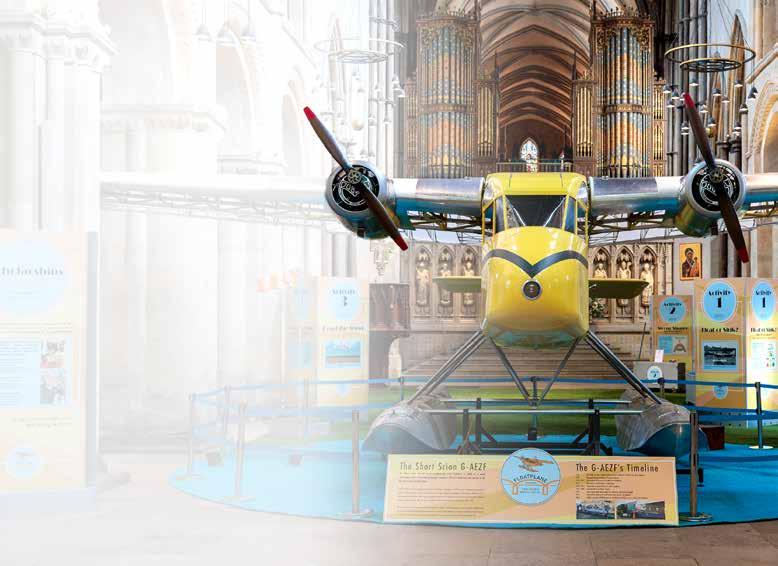
A newly restored Short Scion floatplane is on display in Rochester Cathedral in the hope that it will attract additional visitors to the building throughout August.
According to news service the Religion Media Centre, the bright yellow aircraft – which was built at the Short Brothers factory in Rochester in 1937 – was ‘rescued from dilapidation’ by Medway Aircraft Preservation Society and completely rebuilt, before taking centre stage in the cathedral’s nave.
Alongside the display, the cathedral is open for free family activities exploring engineering, which have been provided by Rochester Bridge Trust to mark the role that Medway has played in aviation history. Visitors are invited to make a windsock, float a platform and learn more about working as an engineer.
Simon Lace, the cathedral’s chief operating officer, explained that, in recent years, staff at Rochester Cathedral have sought new ways to open the space to the public.
‘We are breaking down the barriers so that more and more people can find their way into the sacred space and find something to enjoy,’ he said.
The Short Scion floatplane will be on display in the cathedral until 31 August.
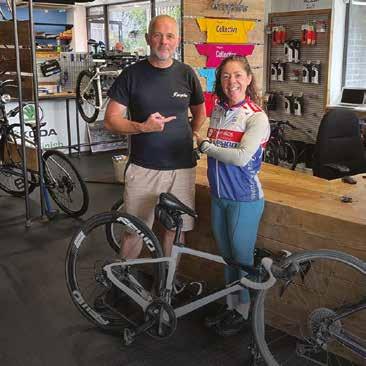
Two days before winning two gold medals at the British Transplant Games, cyclist Jenny Glithero visited The Salvation Army’s Recycles workshop at Booth House in Swindon for last-minute bike repairs.
The liver transplant survivor praised the social enterprise, which offers practical bike skills training and mental health support to people who have experienced homelessness.
Jenny thanked the repair team by saying that their ‘helping hand meant the world’. She added: ‘The Salvation Army’s work is incredible: getting people on bikes, upskilling and offering purpose in times of need.’
Jenny won gold medals in the women’s 30 to 39 age category for the 8km time trial and the 12km road race at the British Transplant Games, which were held in Oxford earlier this month. Her victories follow her near-fatal liver failure in 2021, which left her in a coma and requiring an emergency transplant. Fifteen months after her surgery, she won gold at the 2023 World Transplant Games.
Single mum Coral overcame her feelings of isolation by finding a caring community
Feature by Claire Brine
As a single parent taking care of three children, Coral knows what it’s like to have her hands full.
‘My youngest child is seven and has ADHD,’ she explains. ‘He requires daily medication to help him cope. From 10 months old, he would climb the furniture, bang his head, laugh, then do it again. So I always knew that he had something.
‘In terms of taking care of him, I get occasional support from my mum. But often it’s easier if I just deal with him by myself. As my son’s sole carer, I’m there to help him and protect him – seven days a week. I know what he needs.’
For a long time, when Coral’s older children went off to school each morning, she and her young son would stay at home together. Being in the family home felt easier than venturing outside.
‘It was just the two of us, looking at the same four walls,’ she says. ‘It was lonely, but I also felt it was necessary. I knew that my son was safe with me.
‘If I took my son out and about, I felt that people wouldn’t understand his behaviour. He doesn’t know about boundaries. In people’s homes, he’d be going through their bags and drawers. I knew that people would think he was
naughty, and I worried that they’d see me as a bad mum.’
As a qualified carer, Coral worked full-time when she had her first two children. But she went down to parttime hours when her third child came along. When he started school, she worked three mornings a week.
‘It meant I could focus on him when he came home,’ she explains. ‘Then I was made redundant from the care home that I’d been working at for 10 years. It closed down – which was a blessing really because it enabled me to rethink my path in life. But it was hard to adapt to not working any more. Work is what I have always known.’
I didn’t feel alone any more
Today, Coral receives universal credit, which covers her rent, council tax, household costs and food bills. But it’s not always easy to make ends meet.
‘Sometimes I have to cut back in order to find money for what we need,’ she says. ‘We have the odd treats like biscuits and chocolates, but only when I can afford it.’
After a difficult few years, Coral found
support at The Salvation Army’s Oldham Fitton Hill church.
‘I was at a real low point,’ she recalls. ‘I had hit rock bottom – it was a horrendous time. I think I would have had a breakdown if I hadn’t found support.
‘When I walked into The Salvation Army for the first time, I didn’t know anyone. But I went in and said: “I can’t cope any more. I need help.” Everyone was so understanding, welcoming and non-judgemental. People took the time to listen to me and see how they could help. I didn’t feel alone any more.
‘That day, I had no money, no gas and no electricity – but before I knew it, I had been given a cuppa, food was being arranged for me, and the Army were supporting me by giving me energy top-ups. It was just a stopgap to see me through that particular time of crisis. It helped me get back on my feet.’
Later, Coral learnt that The Salvation Army ran a school holiday activity club, open to families receiving free school meals. She was keen for her son to be included.
‘People at the Army’s activity club are aware of my son’s condition and they are able to accommodate him,’ she says. ‘I know that I could leave him in their care if I wanted to, but I enjoy staying and
taking part in the activities with him. It’s nice to do stuff, just the two of us, plus it gives my older two a break from all the chaos.
‘It’s also good knowing that I can enjoy a brew, build on friendships and have a nice chatter. It takes the pressure off me.
‘The sessions provide a healthy hot lunch and snacks for my son, which is great, but they also offer him so many activities to choose from. There’s a sensory room, he can play board games, he can do some craft. He has even tried gardening and wants to carry on at home! I believe that attending the sessions has helped with his learning and behaviour too.’
Despite the nerves she felt when she took her first step into the Salvation Army church, Coral is thankful for the welcome she received. It prompted her to keep coming back.
‘Taking part in the activities has been the most positive change I have made in my life,’ she says. ‘It has been massive – for me and my family – and our lives have improved. I’ve made good, strong friendships and am part of a fantastic support network. The Salvation Army saves people’s lives.’
l Coral’s name has been changed

Every year teams from around the globe compete in the Homeless World Cup – and this year
Feature by Philip Halcrow
The 500 footballers from 48 countries battling it out on the pitch in Oslo know all about trying to play their way out of a difficult situation. The men and women who make up the 63 teams have demonstrated their footballing skills, developed their confidence and made healthy choices. Now they are walking out at the Homeless World Cup – which is held every year in a different country, and is this year being hosted by The Salvation Army in Norway.
Kicking off today (Saturday 23 August), Oslo 2025 marks the second time that the Norwegian Salvation Army has hosted the competition between teams of players who have experienced homelessness.
‘When the Homeless World Cup was in its early days, we got in contact with the organisers, and they said they didn’t have a partner in Norway,’ says Major Knut Haugsvær, The Salvation Army’s project leader for Oslo 2025. ‘So we
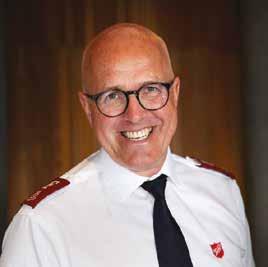
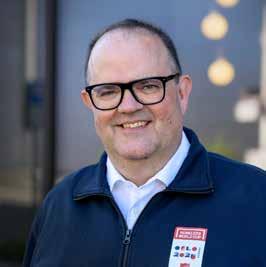

became the partner of the Homeless World Cup Foundation for Norway, and hosted the tournament in 2017. We also run the national team.
‘It is only in Norway where The Salvation Army is the partner – very often it is another NGO or a football association or Big Issue – but when we go away, we are always meeting people who have either lived in a Salvation Army facility or worked for The Salvation Army.’
Hosting the tournament is a major operation, says Andrew Hannevik, assistant communications manager for The Salvation Army in Norway.
‘You’re host to all these players and staff from around the world,’ he explains. ‘So you have to provide accommodation, you have to feed them. The Homeless World Cup Foundation organises the tournament itself, but we arrange the medal ceremonies and the fringe activities – we are holding a forum with politicians
to discuss homelessness and all things around it. We are very fortunate that the government and local government are sponsoring the event, because it’s a huge sum of money.’
Andrew says that The Salvation Army’s footballing philosophy means it was natural for the church and charity to want to host the Homeless Word Cup.
‘We run a lot of teams around the country,’ he says. ‘And every year, we host the national championships, where many teams come – not only Salvation Army teams, but also teams from other NGOs and from some of the elite clubs in Norway, who have activities for people with addictions or mental health issues.
‘And when we recruit for the national men’s and women’s teams, we can select players from all teams.
‘For us, football is a week-in, weekout activity because it’s part of our whole image of how to help people who are


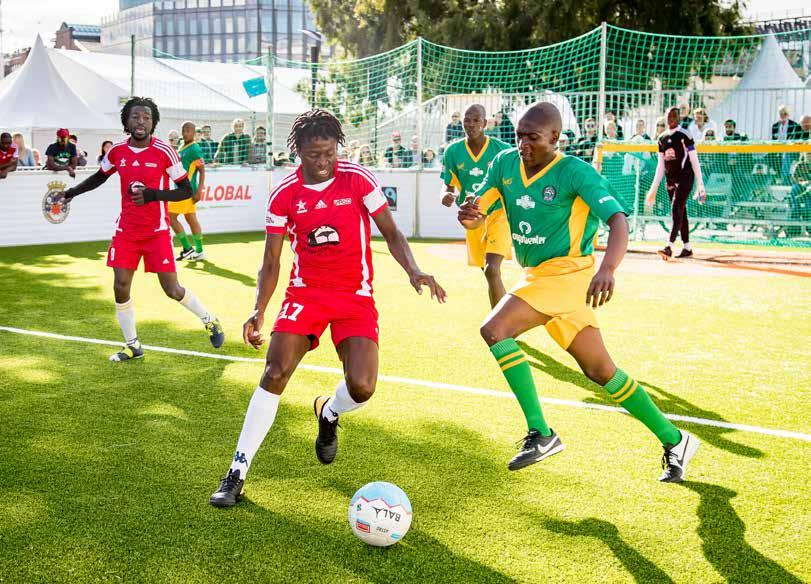

struggling with homelessness and other issues. As well as a place to live, we give them a network and activities.’
Oslo 2025 is the 20th edition of the Homeless World Cup – a tournament that began when Mel Young, co-founder of the Scottish edition of the Big Issue, began casually kicking around the idea with a colleague.
‘The Big Issue had been successful in London, and because of that success other street papers had started up around the world, and we created the International Network of Street Papers,’ says Mel.
‘Once a year, the editors and founders of street papers would get together

to exchange ideas and support one another. At the end of one conference, I was speaking with a colleague from Austria, and we were saying that, while the conference had been great, there had been no homeless people there. We wondered how we could get homeless people involved in events, but we saw that there could be issues around visas or the
Action from the last time Norway hosted the Homeless World Cup

problem of language.
‘But we were both football guys, and we saw that there is an international language called football. We said that there could be a match between Scotland and Austria. In a way, we were just mucking around, but then we said, why don’t all the street papers come and we could call it the Homeless World Cup? We knew football was a very inclusive way of involving people.
‘The next morning, before we left the hotel, we said: Let’s do it.
‘We had the first event in 2003 in Austria. It was an outstanding success in lots of ways. First of all, homeless people changed out of all recognition. Secondly, crowds came to watch and were cheering homeless people, which was not – certainly at the time – usual. Thirdly, the world’s media turned up and wrote positive stories, when – particularly in the UK – there were a lot of negative stories in the press about how homeless people were causing the economy to crash.’
In 2003, 16 teams competed in Graz, Austria. This year, 40 men’s teams and 23 women’s teams are expected to be in Oslo.
Mel says that in the years since the first event, the Homeless World Cup has
had great success in using football to get results.
‘When you’ve been homeless, your selfesteem is gone, your confidence is very low,’ he says. ‘So, well before anyone is selected for their national side, football is making people feel part of a team. It’s building up their confidence so they can kick a ball. It’s showing them that it’s important how you kick the ball. Then there’s the requirement that they come back the next day and be part of the group of guys kicking the ball.
‘Then you are selected to represent your country, and now you’re singing the national anthem. People are applauding you and your selfesteem is rocketing.
Each Homeless World Cup features From page 9
‘It’s not just the tournament. They’ve been through a whole process. But the Homeless World Cup will be what pushed them finally out of homelessness and into our world.’
not only the competition – one between teams made up of men and women, the other between women’s teams – but also discussions on how to end homelessness. And The Salvation Army in Norway adds something else into the mix.
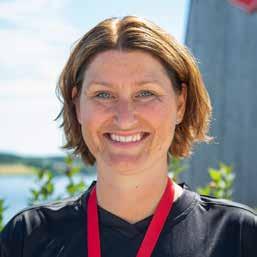
‘Last time we had the tournament, we said that we would like to have a church,’ says Knut. ‘Some people were a little bit sceptical about whether it was OK, because people were coming from all over the world with different religious affiliations


and beliefs or none. But The Salvation Army is a church, so we had to have a church.
‘After a week, we saw that our tent was the one that people came to the most –including the referees and staff. We were serving waffles, having coffee, chatting with people. Sometimes there was music going on, but most of the time it was just people being there together. This is how The Salvation Army is. We are a church without walls.’
Noting that Salvation Army ministers from around the world have been invited to serve as chaplains at the event, Andrew says: ‘If people want to play football and go to sleep afterwards, that’s fine. But we’re just making ourselves available. If somebody wants to talk about anything, we’re there for them.’
Andrew and Knut insist that The Salvation Army wants to help in any way it can – and they believe football has a part to play.
Signe Haukvik Haugen, a project leader with The Salvation Army’s work on housing and a manager of the Norwegian national team in its street soccer programme, agrees.
‘Street soccer means a lot for the 1,334 players all over Norway,’ she says. ‘It brings people together. And it gives the players a reason to wake up in the morning and the strength to make changes in life.’

Carlos Eduardo is playing for the Norwegian national side, which is run by The Salvation Army
‘Ican’t
wait to play for Norway and to walk out on the field with the national jersey and the flag on my chest,’ says Carlos Eduardo, who arrived in the country from Colombia as a boy. ‘I’m hoping to meet a lot of different people, hear their stories and have a memorable time with my team-mates. Many people have had different challenges, and I will be grateful to stand on the field with them.’
Carlos has been through many challenges en route to the Homeless World Cup.
‘For me, it was prison and stuff,’ he says. ‘I was a person who didn’t say no to anything, and it took me to many different places.
‘I’ve been to prison two times, and after the last time I knew I had to take everything more seriously. When I came out of prison in 2020, I didn’t have a place to live, but I knew I couldn’t do more crime. I couldn’t go on in the way I did.’
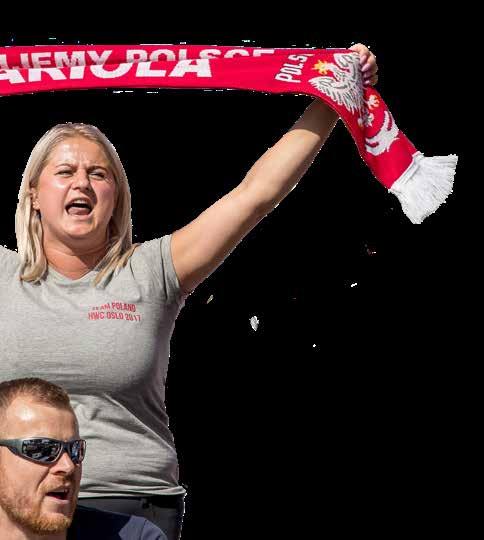
Carlos’s life has changed direction. He now has an apartment. He is a personal trainer and works in a gym. ‘So I use my energy to help other people reach their goals and change their life to a better way,’ he says.
Football has assisted him in making progress. His search for a team to play for eventually led him to The Salvation Army.
‘So I started training with The Salvation Army,’ he says. ‘Its street football team is for homelessness, for people who have been caught up in drugs or been in and out of prison – basically for everybody who has had some challenges in their life.
‘I turned up for practice one day, and they were very welcoming. They didn’t judge you for where you had been or what you had done. I started training two times a week, and in Oslo we also play five against five and seven against seven.
‘So there’s a lot of games, there’s always something going on, and that’s good, because it keeps you off the streets and focused on what you really want to do.’
Carlos talks of how even the process of selecting players for the Homeless World Cup benefits those hoping to make the squad.
‘You have to put in a lot of good work. As well as having footballing ability, you have to be an all-round man, come to training, bring positive energy to the team.
‘Trainers from all over Norway will send the people they think are fit for the team. Then the national team trainers will talk to the other trainers to ask how you are, whether you are socialising, whether you are staying away from trouble, whether you are a good part of the group. We started having gatherings in March and then players were chosen for the national team.
‘I am looking forward to the tournament being in Oslo, because it’s where I live and have a lot of history. So it will be really nice to think about what has happened in the past, where I have been and where I’m at now.
‘Playing football has given me a healthier way of living. I’m able to take better choices now than I did before.’
The War Cry invites readers to send in requests for prayer, including the first names of individuals and details of their circumstances, for publication. Send your Prayerlink requests to warcry@salvationarmy.org.uk or to War Cry, 1 Champion Park, London SE5 8FJ. Mark your correspondence ‘Confidential’.
There is no set formula to becoming a Christian, but many people have found saying this prayer to be a helpful first step to a relationship with God
Unlike the books of prophecy that precede it, Obadiah is not addressed to Israel or Judah but to other descendants of the patriarch Abraham – the people of Edom.
A land of salt marshes and sandstone mountains, Edom is a territory southeast of the Dead Sea. Today, it is part of Jordan, with Petra its most prominent city.
Many Edomites were descendants of Esau, the elder son of Isaac and Rebekah. Esau’s younger twin brother, Jacob, persuaded him to give up his birthright (see Genesis 25:29–34). As a result, Jacob inherited Esau’s birthright and he and his sons went on to inhabit the land flowing with milk and honey, while Esau headed for the barren hills of Edom.
Lord Jesus Christ,
I know that I have done things in my life that are wrong and I’m sorry. Thank you that I can ask you for forgiveness because of the sacrifice you made when you died on the cross.

Please forgive me and help me to live a better life in the future as I learn how to love you and follow your way of living.
Thank you, Lord Jesus.

The perception that Jacob – renamed by God as Israel (Genesis 32:28) –had cheated Esau and his family seeped deep into the Edomite psyche. Israel was the old enemy. Over the years, Edom refused to allow the Israelites to pass through on their way to the Promised Land, they fought against King Jehoshaphat, and they rebelled against King Jehoram.
Now, through the vision of Obadiah, God presents a charge sheet of Edom’s recent offences: allowing violence against Israel (Obadiah verse 10); distancing itself from Israel while Jerusalem was plundered (11); rejoicing over the fall of the city (12); plundering it (13); killing those escaping bloodshed and handing over survivors to the enemy (14).
In the hour of Israel’s greatest need, cousin Edom allowed herself to be governed by centuries-old prejudice and resentment, rather than by basic compassion. Instead of offering refuge within its mountain borders, Edom turned its back and let Israel down.
God’s judgement is clear: ‘Your deeds will return upon your own head’ (15 New International Version). The family of Esau will be destroyed (18), foreigners will occupy Edom (19) and the country will be ruled by Israel (21). Jerusalem fell in 587BC. Edom fell less than 30 years later.

If you’ve prayed this prayer, scan the QR code or contact us using the coupon on this page
































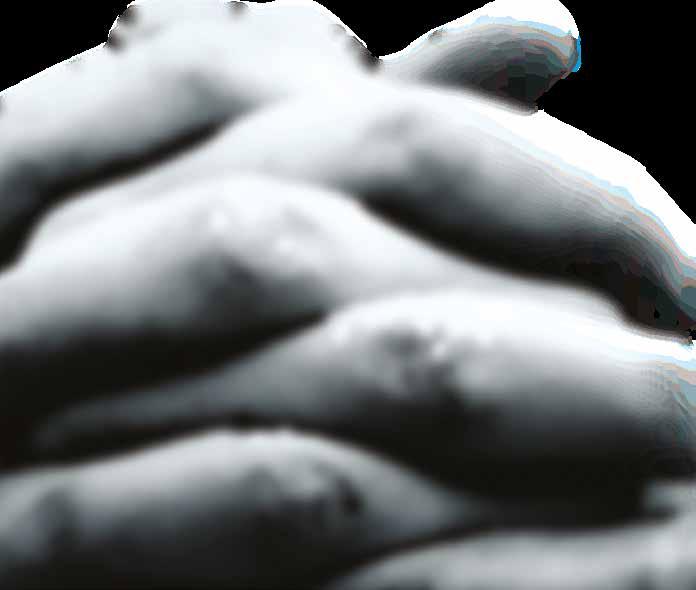
























To receive basic reading about Christianity and information about The Salvation Army, complete this coupon and send it to

War Cry



1 Champion Park London SE5 8FJ a






















In chess, each player begins with how many pawns? 1 2 3 4 5 6
Feature by Ewan Hall
Who had a hit in 1988 with their song ‘Everywhere’?
TOWIE is an abbreviation for which reality TV show?
In which century was Henry VIII crowned King of England?
Who provided the voice of Elsa in the animated Disney film Frozen?
To the nearest hundred, how many bones are in the adult human body?
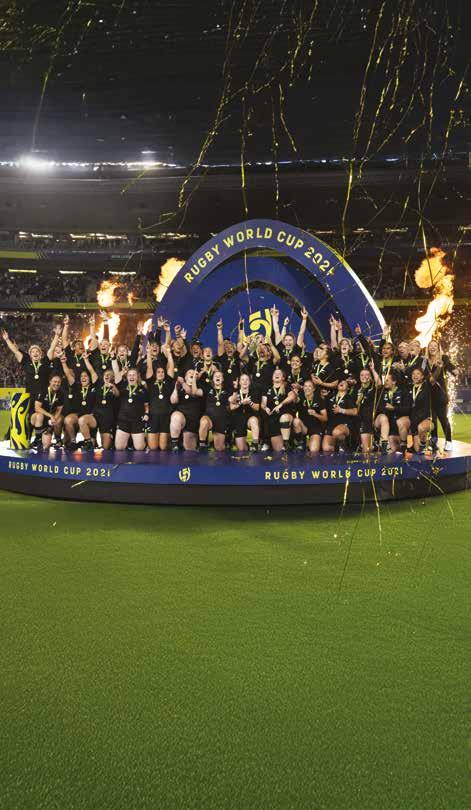
while others have had to compete for their place – including Australia, Wales, Scotland and Ireland.
Whichever country they represent, the members of each squad will be wanting to pitch in and play their part to help their team to be successful. They will push through pain, putting their bodies on the line while tackling the pressures of playing at the highest level of their sport. No doubt, it will be tough and demanding.
However, challenges are not only found on a rugby pitch. In life, we can often find ourselves grappling with the demands of work, the fatigue of social obligations and the weight of family tensions. All of which can leave us feeling weary and isolated.
But we don’t have to face such times alone. There is someone we can turn to when life’s pressures close in. God sees our struggles and wants to help us.
Many people today can identify with the line found in one Bible passage: ‘When I was in trouble, I called to the Lord, and he answered me’ (Psalm 120:1 Good News Bible).
No matter what we may be having to face, God offers us his help. If we choose to put our trust in him, we can find that his strength and guidance are more than a match for every situation.
Fill the grid so that every column, every row and every 3x3 box contains the digits 1 to 9
EASY
7 9 6 8 2 1 3 4 5
8 5 1 4 7 3 6 2 9
3 4 2 9 6 5 7 1 8
1 6 4 7 3 9 5 8 2
9 8 7 1 5 2 4 6 3
2 3 5 6 4 8 9 7 1
6 2 9 3 1 7 8 5 4
5 7 3 2 8 4 1 9 6
4 1 8 5 9 6 2 3 7
MEDIUM
8 6 2 5 4 7 1 9 3
4 7 5 9 3 1 6 2 8
9 3 1 6 2 8 4 5 7
7 4 8 1 5 3 2 6 9
3 1 6 7 9 2 5 8 4
5 2 9 8 6 4 3 7 1
2 9 4 3 8 6 7 1 5
6 5 7 4 1 9 8 3 2
1 8 3 2 7 5 9 4 6
DIFFICULT
6 7 8 4 3 1 9 5 2
1 4 9 5 2 6 7 8 3
3 2 5 8 7 9 4 1 6
5 3 2 7 1 4 8 6 9
7 6 4 3 9 8 1 2 5
9 8 1 6 5 2 3 4 7
4 5 3 1 6 7 2 9 8
2 1 6 9 8 3 5 7 4
8 9 7 2 4 5 6 3 1


Unscramble the letters to reveal some ice-cream flavours
1. AHCTOCEOL
2. EFECFO
3. TSIOPIHCA
4. SPRBEARYR
5. RAALCME
6. RATYRWBSER
7. ALVIALN
8. ANBANA
Look up, down, forwards, backwards and diagonally on the grid to find these UK beaches
BAY
SANDS
1. Custom (5)
5. Cereal (5)
8. Happen (5)
9. Farewell (5)
10. Slacker (5)
11. Haggard (5)
12. Excise (4)
15. Putrefy (6)
17. Deception (5)
18. Rage (6)
20. Guide (4)
25. Snake poison (5)
26. Supple (5)
27. Lever (5)
28. Tend (5)
29. Divide (5)
30. Ogles (5)
1. Warmed (6)
2. Shining (6)
3. Hardy (5)
4. Scour (5)
5. Squirmed (7)
6. Enrol (6)
7. Apathy (6)
13. Employ (3)
14. Make mistakes (3)
15. Merriment (3)
16. Epoch (3)
17. Intense (7)
18. Sir, Dame etc (6)
19. Fatal (6)
21. Cajole (6)
22. Restraint (6)
23. Trap (5)
24. Urge (5)

Each solution starts on the coloured cell and reads clockwise round the number
1. Sweet made with sugar, nuts and egg white
2. Czech Republic’s capital
Orange vegetable
Intense dislike 5. Public procession
6. Physician
The number in each circle is the sum of the two below. By adding up the figures, find the top number
